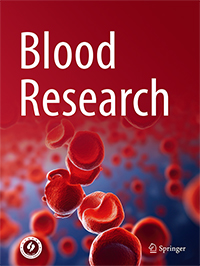Korean J Hematol 2001; 36(1):
Published online March 31, 2001
© The Korean Society of Hematology
일차 혹은 이차 완전관해시 동종 골수이식을 시행한 성인 급성 precursor B-림프구성 백혈병에서 염색체유형이 예후에 미치는 영향
이석, 김동욱, 김유진, 민창기, 이종욱, 박은정, 박윤희, 민우성, 김춘추
가톨릭대학교 의과대학 조혈모세포이식센터
Influence of Karyotype on Outcome of Allogeneic Bone Marrow Transplantation for Adults with Precursor B-Lineage Acute Lymphoblastic Leukemia in First or Second Remission
Background: The discrepancy of therapeutic outcome between pediatric and adult patients with acute lymphoblastic leukemia (ALL) can be attributed in part to the higher frequency of adverse genetic abnormalities in adults. Several features
such as
age, leukocyte count, karyotype, and the rapidity of leukemic cell clearance have been noted to influence outcome of adult ALL in chemotherapy setting. However, the prognostic relevance of these factors has not been definitely evaluated in
allogeneic
BMT setting.
Methods: A total of 41 consecutive adults with precursor B-lineage ALL who had a successful karyotype and treated with allogeneic BMT while in first or second complete remission (CR) were entered onto the study. Cases known to be t(9;22)
or
t(4;11) were classified as unfavorable karyotype.
Results: There were 21 males and 20 females with median age 27 (range, 15~43) years. The distribution of FAB types was as follows : L1 26 cases (63.4%), L2 15 cases (36.6%). Unfavorable karyotypes were identified in 12 patients (29.3%).
Disease
status at the time of transplant was first CR (n=37) or second CR (n=4). With a median follow-up of 26 months (range, 7~65 months), the probability of disease-free survival (DFS) was 66.5% and 49.9% at 2 and 5 years, respectively. In univariate
analyses, characteristics predicting for worse DFS were FAB type (L2), pretransplant status (second CR) and unfavorable karyotype. Further multivariate analysis showed that the most powerful predictive factor for DFS was karyotype (P<0.01).
Conclusion: Our clinical data shows that karyotype is the most important prognostic factor in adult precursor B-ALL after allogeneic BMT.
Keywords Adult acute lymphoblastic leukemia; Allogeneic bone marrow transplantation; Karyotype; Prognostic factor;
Article
Korean J Hematol 2001; 36(1): 43-50
Published online March 31, 2001
Copyright © The Korean Society of Hematology.
일차 혹은 이차 완전관해시 동종 골수이식을 시행한 성인 급성 precursor B-림프구성 백혈병에서 염색체유형이 예후에 미치는 영향
이석, 김동욱, 김유진, 민창기, 이종욱, 박은정, 박윤희, 민우성, 김춘추
가톨릭대학교 의과대학 조혈모세포이식센터
Influence of Karyotype on Outcome of Allogeneic Bone Marrow Transplantation for Adults with Precursor B-Lineage Acute Lymphoblastic Leukemia in First or Second Remission
Seok lee, Dong Wook Kim, Yoo Jin Kim, Chang Ki Min, Jong Wook Lee, Eun Joung Park, Yoon Hee Park, Woo Sung Min, Chun Choo Kim
Catholic Hemopoietic Stem Cell Transplantation Center, College of Medicine The Catholic University of Korea, Seoul, Korea
Abstract
Background: The discrepancy of therapeutic outcome between pediatric and adult patients with acute lymphoblastic leukemia (ALL) can be attributed in part to the higher frequency of adverse genetic abnormalities in adults. Several features
such as
age, leukocyte count, karyotype, and the rapidity of leukemic cell clearance have been noted to influence outcome of adult ALL in chemotherapy setting. However, the prognostic relevance of these factors has not been definitely evaluated in
allogeneic
BMT setting.
Methods: A total of 41 consecutive adults with precursor B-lineage ALL who had a successful karyotype and treated with allogeneic BMT while in first or second complete remission (CR) were entered onto the study. Cases known to be t(9;22)
or
t(4;11) were classified as unfavorable karyotype.
Results: There were 21 males and 20 females with median age 27 (range, 15~43) years. The distribution of FAB types was as follows : L1 26 cases (63.4%), L2 15 cases (36.6%). Unfavorable karyotypes were identified in 12 patients (29.3%).
Disease
status at the time of transplant was first CR (n=37) or second CR (n=4). With a median follow-up of 26 months (range, 7~65 months), the probability of disease-free survival (DFS) was 66.5% and 49.9% at 2 and 5 years, respectively. In univariate
analyses, characteristics predicting for worse DFS were FAB type (L2), pretransplant status (second CR) and unfavorable karyotype. Further multivariate analysis showed that the most powerful predictive factor for DFS was karyotype (P<0.01).
Conclusion: Our clinical data shows that karyotype is the most important prognostic factor in adult precursor B-ALL after allogeneic BMT.
Keywords: Adult acute lymphoblastic leukemia, Allogeneic bone marrow transplantation, Karyotype, Prognostic factor,





 PDF
PDF Standard view
Standard view Export citation
Export citation Share
Share  Previous Article
Previous Article



